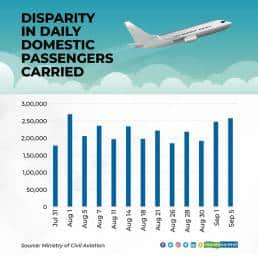



Increasing vaccination and declining COVID-19 cases in most parts of India have given travellers the confidence to book air tickets weeks in advance instead of flying at short notice because of lockdowns or emergencies.
Industry experts and airline executives say that in view of the changed customer behaviour, the government should ease the restriction on capacity utilization and fares, which was imposed to help the smaller carriers withstand the disruption caused by the pandemic.
Airlines are allowed to sell seats up to 72.5 percent of their capacity of a schedule during a season and the minimum and maximum fares for the shortest flights, Class A, have been set at Rs 2,900 and Rs 8,800, respectively.
Changing customer behaviour?
Online travel agency Ixigo’s group chief executive officer and co-founder Aloke Bajpai told Moneycontrol last week that as people are getting vaccinated and COVID-19 cases are declining, the advanced purchase window has again started increasing.
"So people are generally now comfortable booking, you know, a few weeks or maybe even a month in advance. This is being accelerated by the way the government’s caps on airline tickets are working right now," Bajpai had said.
Industry experts, airlines, and other online travel agents (OTA) companies agree.
An official from Yatra.com told Moneycontrol that in the past month nearly 55 percent of air tickets booked from the website were for travel 30 days in advance.
Airlines and OTAs offering customers a complete refund on advance bookings and options to reschedule flights is also helping passengers comfortably book flights in advance.
Cheaper tickets
The rise in pre-booking of flights for the latter part of the year gives airlines the opportunity to offer prices at a rate lower than the government's prescribed lower cap.
“While price caps are helping some Indian airlines with weaker financial books since capacity utilisation is still capped and there isn’t a lot of demand across the country, higher floor prices are further causing a hesitancy to travel," Lokesh Sharma, a senior aviation and defence consultant, said.
Airlines are also looking to capitalise on the opportunity and are offering customers cheaper tickets beyond the government's deadline and increasing their passenger load factors for flights that are seeing lots of traction, multiple industry experts told Moneycontrol.
"Airlines are looking to increase operating efficiencies of their flights as they are forced to operate with a limited capacity at the moment," a senior aviation and defense analyst from Goldman Sachs said.
An official from IndiGo told Moneycontrol that advance bookings had increased. He said the airline was pushing for advance bookings to encourage passengers to travel again and had launched attractive packages and tour options around the festival season.
Similarly, an official from GoFirst said that the airline expects traffic to rise further during the upcoming festival season and had launched packages to boost demand.
The government's regulation for capacity utilization by domestic airlines is open-ended, and in place until the ministry revises the regulation.
The regulation on ticket prices is imposed for a period of 30 days at the start of every month and is rolled over again next month based on the COVID-19 situation in the country.
This lets domestic airlines offer flight tickets at prices much lower or higher than the prescribed caps beyond the government's set deadline, which currently is September 30.
The International Air Transport Association said the Indian aviation market's recovery had been significantly impacted by caps on fares and capacity.
"Without question, the demand in India is way in excess to the capacity that is in the market at the moment ... If these capacity constraints were removed, without question, there would be significantly more demand for flights that are operating in India," Willie Walsh the director-general of global airlines body IATA last month said.
What does the data show?
Domestic passenger traffic has spiked since August. It crossed the 2 lakh mark for the first time after 110 days, while the flight count crossed the 2,000 mark. Passenger traffic rose to 2.6 lakh on September 5 after being 2-2.3 lakh throughout August.

Websites of airlines show that domestic tickets on the same route are 60 percent cheaper in October compared with the previous month. For instance, on the Delhi-Mumbai route, the cheapest tickets on offer in September are for around Rs 4,900, while in October they are available for as low as Rs 2,200, data from the websites of airlines collected by Moneycontrol showed.

Discover the latest Business News, Sensex, and Nifty updates. Obtain Personal Finance insights, tax queries, and expert opinions on Moneycontrol or download the Moneycontrol App to stay updated!
Find the best of Al News in one place, specially curated for you every weekend.
Stay on top of the latest tech trends and biggest startup news.